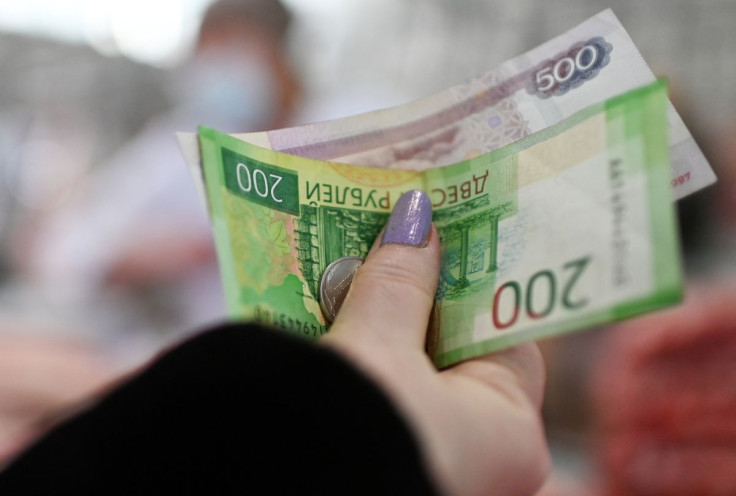Russian Rouble Plummets 3%, Bonds Hammered As Ukraine Declares State Of Emergency

The Russian rouble slumped on Wednesday, diving around 3% to hit a near two-year low past 81 to the dollar as Ukraine declared a state of emergency, with sanctions and invasion fears hammering Russian bonds and stocks.
Western nations responded to President Vladimir Putin's recognition of separatist enclaves in the Donbass region of eastern Ukraine and subsequent orders to send in "peacekeeping" troops with plans to target banks and elites. Germany froze a major gas pipeline project from Russia, and London and Washington targeted Russian debt.
Ukraine told its citizens in Russia to come home, while Moscow began evacuating its Kyiv embassy in the latest ominous sign for Ukrainians who fear an all-out Russian military onslaught.
By 2020 GMT, the rouble was 3.1% weaker against the dollar at 81.26, earlier sinking to 81.3975, its weakest point since March 23, 2020.
It had lost 2.7% to trade at 91.86 against the euro, earlier hitting 92 for the first time since April 2021.
Russia was celebrating the Defender of the Fatherland public holiday on Wednesday, with many traders away from their desks, but some trading went on.
Russia's high interest rates, copious reserves and strong balance of payments should make the rouble one of the strongest currencies, said Dirk Willer, global head of macro and asset allocation at Citi, but people are scared of sanctions.
"Buying the dip may be the right response to geopolitics but it's not necessarily true for the part of the world where the fire is actually burning," he said.
The initial round of sanctions stopped short of targeting major financial institutions, meaning their impact could be rather symbolic, but additional measures soon followed and the European Union was due to hold an emergency summit on Thursday.
"There is probably scope for further falls if sanctions are imposed due to the uncertainty about whether sanctions will need to be ratcheted up further in order to influence Russian policy," said William Jackson of Capital Economics, anticipating that the rouble may fall by another 10% in that scenario, pushing up already high inflation.
The sharp drop in the rouble from levels around 70 to the greenback seen four months ago is expected to fuel accelerating inflation, one of the main concerns among Russians, which would dent the country's already falling living standards.
BOND MARKET ROUT
Russia's finance ministry on Wednesday said it would offer only new series of OFZ government bonds from now on, in response to U.S. sanctions on the secondary market for Russian debt.
Russia's sovereign dollar bonds suffered their worst day since the spring 2020 COVID market rout, with some longer-dated bonds tumbling more than 10 cents and the 2047 issue hitting a record low of 84.466 cents.
The cost of insuring exposure to Russia's debt through credit default swaps soared past 400 bps for the first time in nearly seven years.
The premium demanded by investors to hold Russian debt over safe haven U.S. Treasuries blew out to 449 bps - well above the levels for smaller and riskier frontier markets such as Bolivia or the Dominican Republic.
Brent crude oil, a global benchmark for Russia's main export, was up 0.2% at $96.64 a barrel.
Russia's dollar-denominated RTS index closed 1.8% to 1,204.1 points, but Russian stocks' foreign listings felt serious pressure.
U.S.-listed VanEck Russia ETF dropped nearly 10% to hit its lowest level since May 2020 while Russian e-commerce platform Ozon Holdings and internet company Yandex N.V. suffered drops of around 12%.
© Copyright Thomson Reuters 2024. All rights reserved.




















